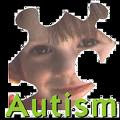Hi Everyone,
I debated today as to whether or not to move all of my Autism resource links to a separate blog because they are getting so long. I decided not to, because it goes against the grain for me to set the Austism apart from all of the other aspects of my teaching life. There has been an enormous increase in the number of children with an ASD diagnosis over the past few years. I would be very surprised if most teachers have not worked with at least one child on the Autism Spectrum during their teaching career.I have been reading with interest a blog written by Patricia Robinson . She describes herself as a therapist who works with kids and parents with a focus on social skills for those with Autism, Aspergers and ADHD.The blog is full of fantastic advise and information to share with parents, teachers and other community members. I have copied and pasted a post from her blog below. If you would like to read some more of her posts just click on the link.
'Kids who struggle with social skills, such as those with Asperger’s, autism and ADHD, frequently have difficulty when it comes down to the rules of the games they play. If parents are playing the game, the adults may be flexible and adapt to their children, but it can be a big problem when the children are playing with other kids. Too often the fun of the interaction is ruined by arguments about the rules.
Many children with autism, Asperger’s and ADD tend to be black and white thinkers, and they insist on following the official game rules to the letter. They may become the game’s self appointed judge, reading the box for every detail. That’s fine if all the players are in agreement. But sometimes, the rest of the kids just want to play. They may have their own traditional rules, or they may have come up with their own rules for special circumstances. It’s important for kids to be aware that following the rules is a bit of a gray area. Kids who read social signals easily can pick up on the tone of the game and figure out how methodically their playmates want to follow the rules.
Other children who struggle with social skills love to set up the rules. They may insist that the way they played last time is the only correct way, or the rules used at school must apply at home. Frequently, these individualized rules are complicated and only explained when it’s to the advantage of the rule maker. (As a children’s play therapist, I’ve spent many hours playing games without being told the rules!)
Parents are important in helping kids understand how to play games, and how rigidly the rules should be followed. Think about a friendly poker game versus the World Tournament of Poker. Children need to realize both ideas, “rules are rules” and at the same time, “rules are made to be broken.” It all depends on who’s playing.'






.jpg)


.jpg)









.jpg)

.jpg)




.jpg)













.jpeg)


















No comments:
Post a Comment